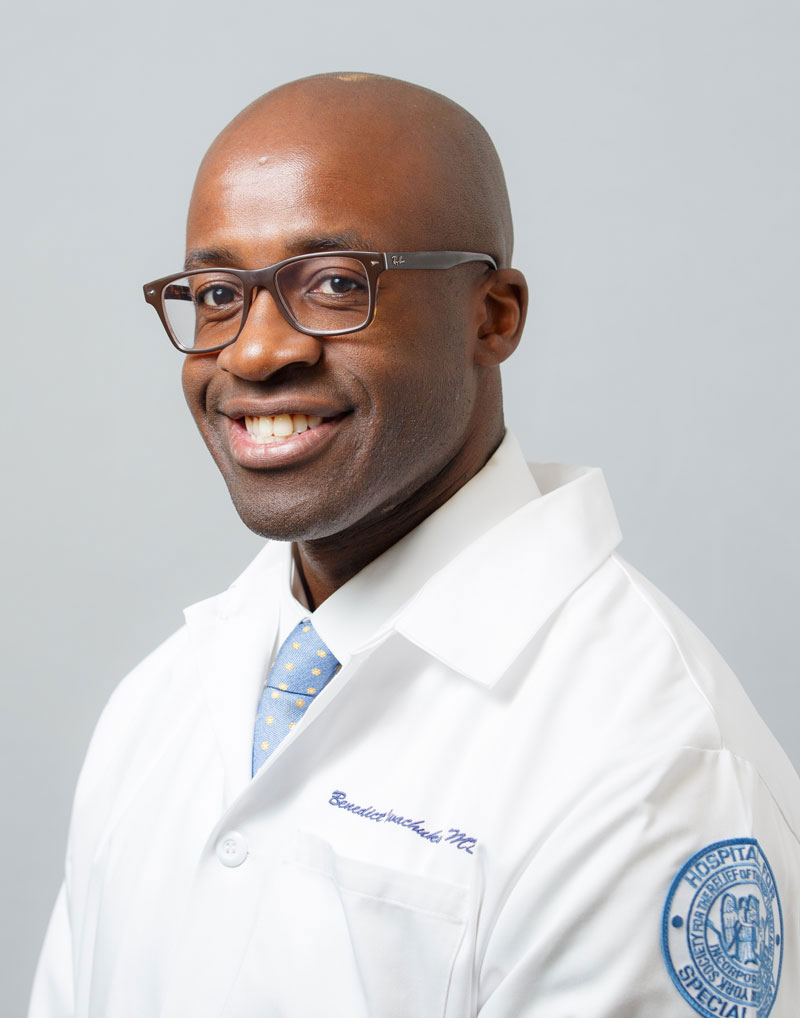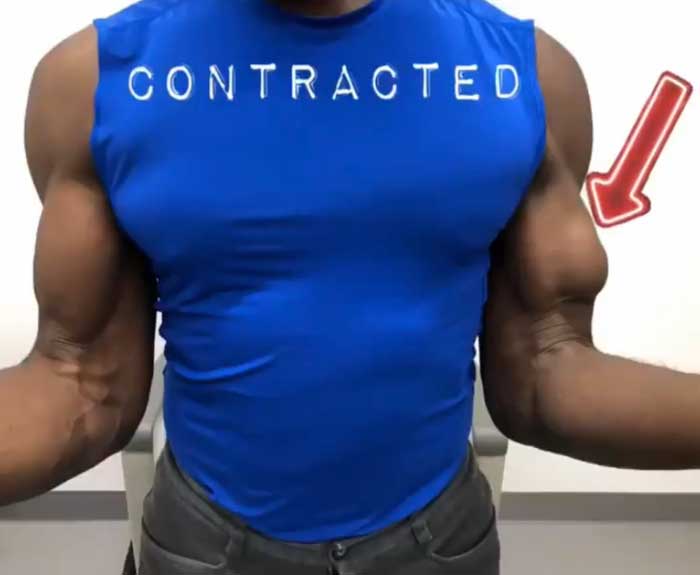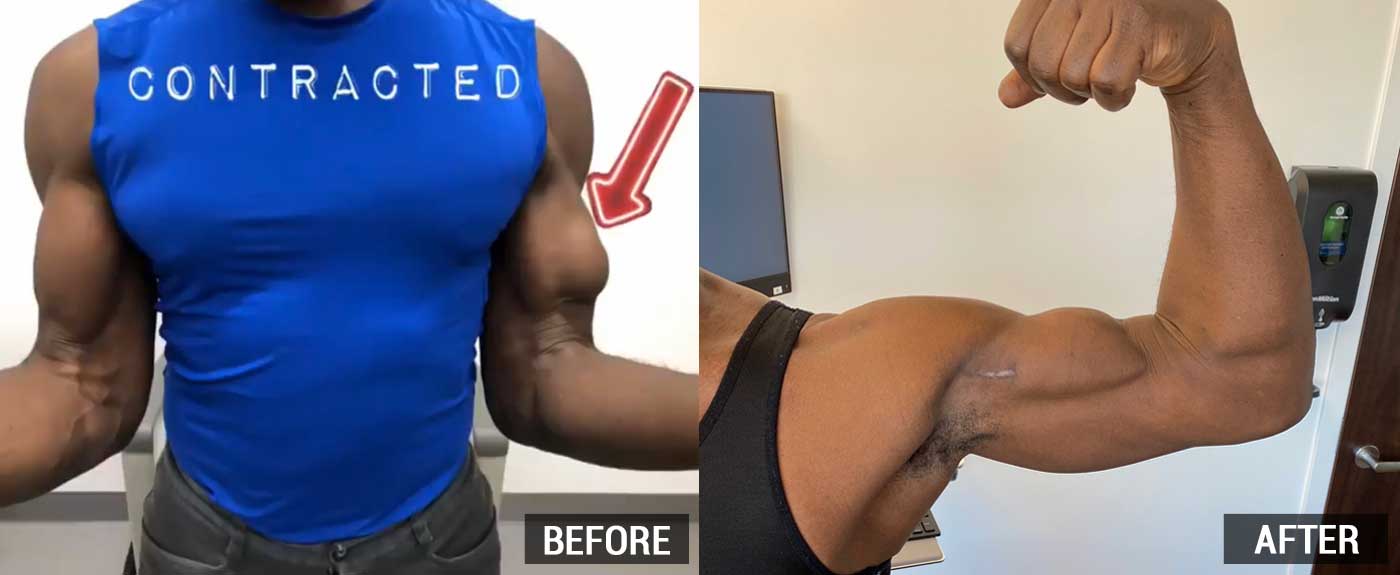Biceps Tendon Repair Surgeon

Are you an athlete who participates in sports that require heavy lifting? Have you had a recent accident, falling on an outstretched arm, or experienced sudden, intense shoulder pain with or without a popping sound? If so, you may have experienced a biceps tendon tear. Most often caused by overuse, biceps tendon tears can severely affect arm and shoulder function. Biceps tendon tear repair surgeon, Doctor Benedict Nwachukwu provides diagnosis as well as surgical and nonsurgical treatment options for patients in Manhattan, Brooklyn, New York City, NY who have torn their biceps tendon. Contact Dr. Nwachukwu’s team today!
What are the biceps tendons?
The biceps are two muscles in the upper arm that originate separately at the top of the shoulder and attach together at the elbow. Tendons attach these muscles to the bone and one part of the muscle, called the long head tendon, passes inside the shoulder joint and attaches directly to the labrum in the shoulder. The second muscle, called the short head, attaches to a small finger-like protrusion on the shoulder blade called the coracoid process. The two biceps muscles merge into one on the front of your arm and are attached again, just past the elbow at the radial tuberosity. The biceps are the muscles responsible for bending the arm at the elbow and rotating the upper arm.
What is a biceps tendon injury?
The biceps are used countless times a day for strength and rotation of the arm. They are relied on for a huge range of activities and are in constant demand. Because of the constant use and demand on these muscles, biceps tendon injuries are common and can cause sudden and severe shoulder or elbow pain. The tendons may fray away from their attachment site from a work or sports injury, a fall or from extreme wear and tear. Shoulder surgeon, Dr. Benedict Nwachukwu helps patients in Manhattan, New York City and surrounding New York boroughs return to their normal activities following a biceps tendon injury.
What kinds of biceps tendon tears are there?
There are two specific types of biceps tendon injuries and they are defined by where the tear is located:
Proximal Biceps Tendon Tear
Occur when one of the tendons that attaches the biceps to the shoulder tears. Most frequently, the long head tendon tears away from the labrum in the shoulder. Over-use is the often the cause for this injury and while it can be serious if other structures are also damaged, it does not always require surgery.
Distal Biceps Tendon Tear
Occur at the elbow when the tendon pulls or tears away from the attachment site at the radial tuberosity. This type of injury most often occurs when the elbow is pushed straight from a heavy weight. Distal biceps tendon tears are commonly seen in weightlifters or from lifting something very heavy. Biceps tendon tears are uncommon and require immediate surgery to reattach the tendon at the elbow.
What are the symptoms of a biceps tendon tear?
Biceps tendon tears attached to the shoulder labrum are most common, while tears in the short head or in the attachment near the elbow, seldom occur. The symptoms of a torn bicep are similar, rather it is at the shoulder or the elbow. Common symptoms include:
- Intense and sudden pain in the upper arm, elbow or the site of the tear.
- Pain that resolves in a few days.
- Feeling or hearing a “pop” when the tendon tears.
- Cramping in the biceps.
- Swelling.
- Pain and tenderness at the shoulder and/or elbow.
- A physical change in the front of the arm, sometimes a bulge due to the fact the tendon is no longer holding the muscle in place. This is commonly called a “Popeye muscle.”
How is a biceps tendon tear diagnosed?
For patients in Manhattan, New York City and surrounding New York boroughs, Dr. Nwachukwu will perform a physical exam. If a torn biceps tendon is suspected, an ultrasound in the office may reveal a rupture of the tendon or rotator cuff. An MRI may also be ordered to confirm the diagnosis and show the extent of the tear and other related damage.

How is a biceps tendon tear treated?
Non-Surgical Treatment
Some biceps tendon tears do not need surgery. Partial tears or minor injuries can be treated with ice, rest and anti-inflammatory medication. If the rotator cuff has been torn, or if the labrum is involved, patients are advised to avoid heavy lifting and strenuous activity until the tear heals completely. Physical therapy is then recommended to regain strength and flexibility.
Surgical Treatment
Dr. Nwachukwu will discuss patient options following a biceps tendon injury, based on their age, activity level and severity of the injury. Biceps tendon tears that occur near the elbow almost always require surgery and should occur within a week or two of the injury. Biceps tendon tears at the shoulder can be repaired with a minimally invasive surgery called arthroscopic repair.
How is a proximal biceps tendon repair done?
Dr. Nwachukwu is experienced in complex shoulder procedures and uses small incisions to re-anchor the torn tendon back to the bone. The biceps tendon is not reattached to its original origin within the shoulder, it is instead, attached to the humerus in a procedure called a “biceps tenodesis.” If only a small part of the tendon is torn, a debridement (smoothing) of the torn fibers may be all that is required. For larger biceps tendon tears that involve other structures in the shoulder, a rotator cuff repair or labral repair may be required.
How long is the recovery after a biceps tendon repair?
Recovery time after a biceps tendon repair will vary, based on any other repairs that occurred with the surgery. Typically, patients are placed in a sling for about 4 weeks which can be taken off to shower or to do physical therapy. Dr. Nwachukwu will have a set of post-surgical protocols that require physical therapy and exercises to be done at home. Activities with low risk of shoulder injury, like jogging, may occur in about 3 months. Sports activities can begin slowly and with doctor approval. For higher risk activities, such as baseball or softball, players can expect to return to normal play after careful rehabilitation between 6 and 12 months.
For more information on biceps tendon tears or other biceps injuries, please contact the orthopedic office of Benedict Nwachukwu, MD, orthopedic shoulder surgeon serving Manhattan, New York City and surrounding New York boroughs.
Location
610 W 58th Street
New York, NY 10019
148 39th Street, 7th Floor
Brooklyn, NY 11232
Fax: 646-885-8252
Office Hours
HSS Sports Medicine Institute West Side
Monday: 8:00 am – 5:00 pm
Tuesday: 8:00 am – 5:00 pm
Wednesday: 8:00 am – 5:00 pm
Thursday: 8:00 am – 5:00 pm
HSS Brooklyn
Friday: 8:00 am – 5:00 pm

